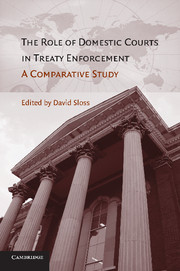Book contents
- Frontmatter
- Contents
- Contributors
- Preface
- Acknowledgments
- 1 Treaty Enforcement in Domestic Courts: A Comparative Analysis
- 2 Does International Law Obligate States to Open Their National Courts to Persons for the Invocation of Treaty Norms That Protect or Benefit Persons?
- 3 Australia
- 4 Canada
- 5 Germany
- 6 India
- 7 Israel
- 8 The Netherlands
- 9 Poland
- 10 Russian Federation
- 11 South Africa
- 12 United Kingdom
- 13 United States
- 14 The Role of Domestic Courts in Treaty Enforcement: Summary and Conclusions
- Index
- References
12 - United Kingdom
Published online by Cambridge University Press: 06 January 2010
- Frontmatter
- Contents
- Contributors
- Preface
- Acknowledgments
- 1 Treaty Enforcement in Domestic Courts: A Comparative Analysis
- 2 Does International Law Obligate States to Open Their National Courts to Persons for the Invocation of Treaty Norms That Protect or Benefit Persons?
- 3 Australia
- 4 Canada
- 5 Germany
- 6 India
- 7 Israel
- 8 The Netherlands
- 9 Poland
- 10 Russian Federation
- 11 South Africa
- 12 United Kingdom
- 13 United States
- 14 The Role of Domestic Courts in Treaty Enforcement: Summary and Conclusions
- Index
- References
Summary
INTRODUCTION
When it comes to treaties, the United Kingdom is very much a dualist state. A proper understanding of how treaties are (or are not) implemented and enforced in the English legal system requires a reasonably detailed description of this form of dualism. It is also important because most of the other fifty-two Commonwealth States are former British overseas territories that inherited the same, or very similar, constitutional principles about the place of treaties in domestic law. This will be followed by a description of how the English courts approach the matter of interpretation of treaties, which is central to an understanding of how private rights can (or cannot) be enforced. (We are not concerned with so-called collective rights, such as those set out in the International Covenant on Economic, Social and Cultural Rights 1966.) Then, the question of the extent to which English courts recognize and enforce rights conferred on private parties under treaties will be discussed. Finally, there will be a concise description of the remedies that may be available for the enforcement of private rights.
Only the position in English law is dealt with here. The legal system in Scotland – and, to some extent, in Northern Ireland – is slightly different (it is a foolhardy Englishman who ventures onto Scottish or Irish turf), though the constitutional place of treaties is the same throughout the United Kingdom and its remaining overseas territories.
- Type
- Chapter
- Information
- The Role of Domestic Courts in Treaty EnforcementA Comparative Study, pp. 476 - 503Publisher: Cambridge University PressPrint publication year: 2009
References
- 1
- Cited by



